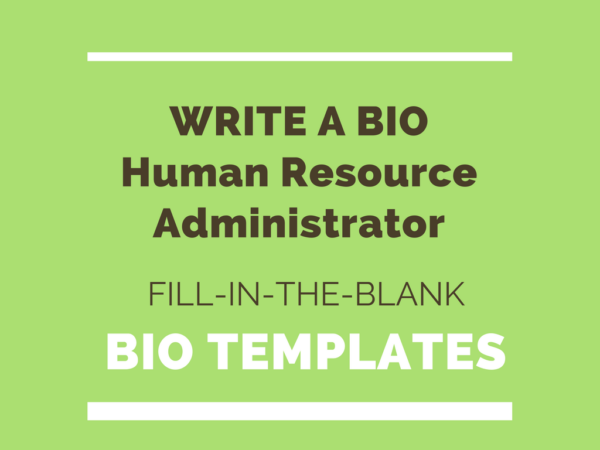
If you are an HR professional, you need to write a bio that explains more than simply what your resume says. A human resources biography needs to focus on very specific skills, training, and knowledge. Here are some of the elements you’ll want to stress in your HR bio:
1. Start out with name, title and current company
When writing your human resources biography, start with the basics: name, position and company. Then move on to crafting a narrative that lets potential employers or clients know that you understand the importance of your work and you have the skills, abilities, and personal suitability to work with managers and employees, no matter the circumstances. The first sentence of your bio might be something like this:
_____________ (your name) has been employed at ____________ (your place of employment) as a human resources administrator for _____ (number) years.
2. Your background, experience, and skill set
Describe your current and past success in providing support and advice to operational managers and executive staff, whether that’s recruitment and employment, training and development, labour relations, benefits administration, and the development of organizational culture. This could be worded something along these lines:
Having worked mostly in the area/s of _______________(specify type of business/es e.g. catering, IT, finance, education) for _____________ (specify where you have worked, e.g. small businesses, educational facilities, non-profit organizations, international corporations), he/she is very familiar with ___________, ___________ and ___________(aspects of your job e.g. executive compensation; payroll; staff training; recruitment; financial document support). She/He is particularly experienced in the areas of ___________, ___________ and ___________ (your special abilities or strengths, e.g. strategic advice to operational managers; directing the administrative functions of complex organizations; developing company culture; mediating disputes)
3. Your ability to represent the company
Remember to include your outreach and liaison initiatives, as well as your internal responsibilities. Here’s some sample wording:
_________ (your name) served as chief spokesperson and representative for ______________ (name of company, business or organization), and built bridges with ______________, _____________, and ______________ (connections formed, e.g. the community; universities; business leaders) to enhance awareness of company initiatives.
4. Your formal and continuing education
While a small company may just be looking for someone with a general business background, many large companies want HR staff who have specifically trained for that position. If you’ve had specialized HR courses, or if you’ve taken advantage of continuing education offerings to stay current on labor regulations for example, you’ll want to prominently highlight those opportunities in addition to your formal degree education. Example wording to address your education:
______________(your name) earned his/her __________ (type of qualification e.g. degree, diploma, certificate) from __________ (name of institution/college/university) in ____________(location of institution/college/university). She/He is a __________ (any other designations you hold) and is also certified in _______________ from ______________.
5. Discretion and confidentiality
Human Resources people need to have an understanding of and ability to deal with sensitive information, such as HR professionals resumes, background checks, federal forms, union issues, performance evaluations, and many other documents that contain sensitive material. You’ll want to stress that you know how to process and handle these issues in accordance with policies and regulations. In terms of confidentiality, you have as heavy a responsibility as a doctor, attorney, or accountant.
6. Interpersonal Skills
HR staff often have to deal with people at a very low ebb in their lives—when they’re being turned down for a job or dismissed from the one they have. There is no easy way to tell someone that he or she is not going to “make it” at a company. In your bio, you should demonstrate that you have the ability to stay calm and professional when others are upset.
7. Finish with Personal Details (Optional)
It’s a convention in professional biographies to include something that gives a sense of who you are outside of work. However, if you don’t feel comfortable with that, you can certainly skip it. For those who do include personal informaiton, it often looks something like this:
_________ (your name) lives in _________ (city) with his/her (wife, husband, partner) ________ (OPTIONAL: name of significant other) and their _______ (number) _______ (children, cats, dogs). When _________ (your name) is not working, he/she likes to _________ (your hobbies). _______ (your name) can be reached at _______ (your business contact information).
Need a more in-depth bio? In a hurry? If so, go here to get a professionally written full-length “fill-in-the-blanks” bio template for a Human Resources professional.
